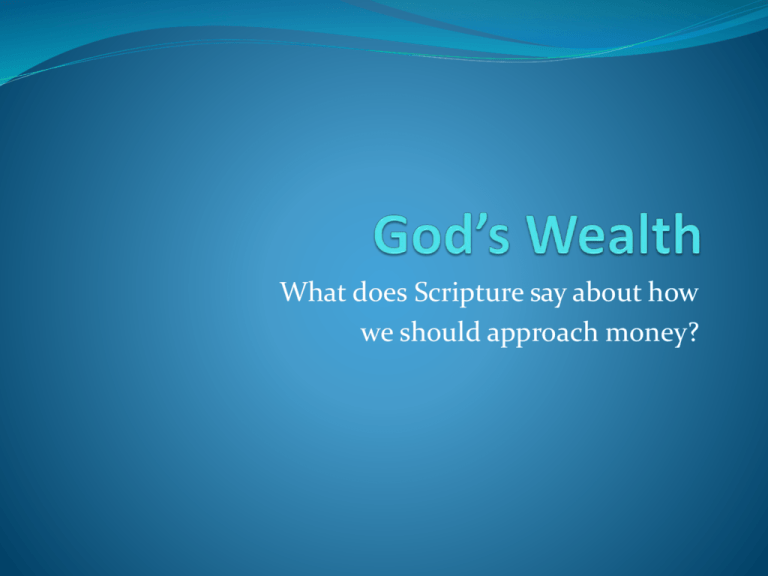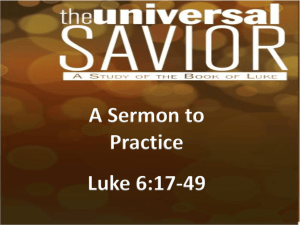God*s Economy
advertisement

What does Scripture say about how we should approach money? What does the Bible say about poverty and wealth? Give me neither poverty nor riches; feed me with the food that I need, or I shall be full, and deny you, and say, ‘Who is the LORD?’ or I shall be poor, and steal, and profane the name of my God. Proverbs 30:8b-9 The Bible has some pretty clear ideas about what our relationship to money should be. Matthew 6:24 Serving Two Masters ‘No one can serve two masters; for a slave will either hate the one and love the other, or be devoted to the one and despise the other. You cannot serve God and wealth. According to the Bible? Yep, because it gets in the way of relationships. There are numerous examples of wealth being an issue in scripture. Here are a few from the Old Here are a few from the New Testament. Testament. Exodus 16 – This is the story of the Manna given by God, no one could have too much, or too little. Deuteronomy 15 – The Sabbath vision of Jubilee when debts will be forgiven and every 50 years all land will be redistributed to avoid certain families or tribes gaining too much wealth. So that all have enough. Luke 16:19-31 - Poor Man Lazarus, who is neglect by his rich neighbor, who then is neglected in hell. Mark 10:17-31 - Jesus tells a rich young man to give away his wealth to be closer to God, but he couldn’t, this surprised the disciples, because only God can save, not our efforts. Are we to just give away our wealth to anyone? It is important to contribute. 2 Thessalonians 3:6-15 Warning against Idleness Now we command you, beloved, in the name of our Lord Jesus Christ, to keep away from believers who are living in idleness and not according to the tradition that they received from us. For you yourselves know how you ought to imitate us; we were not idle when we were with you, and we did not eat anyone’s bread without paying for it; but with toil and labor we worked night and day, so that we might not burden any of you. This was not because we do not have that right, but in order to give you an example to imitate. For even when we were with you, we gave you this command: Anyone unwilling to work should not eat. For we hear that some of you are living in idleness, mere busybodies, not doing any work. Now such persons we command and exhort in the Lord Jesus Christ to do their work quietly and to earn their own living. Brothers and sisters, do not be weary in doing what is right. Take note of those who do not obey what we say in this letter; have nothing to do with them, so that they may be ashamed. Do not regard them as enemies, but warn them as believers. Scripture recognizes that systems often take advantage of the poor. Amos 8:5-6- We will make the ephah small and the shekel great, and practice deceit with false balances, 6 buying the poor for silver and the needy for a pair of sandals, and selling the sweepings of the wheat.’ Jesus also fought against a system that took advantage of the meek. Luke 20:45-47 Jesus Denounces the Scribes 45 In the hearing of all the people he said to he disciples, 46‘Beware of the scribes, who like to walk around in long robes, and love to be greeted with respect in the market-places, and to have the best seats in the synagogues and places of honor at banquets. 47They devour widows’ houses and for the sake of appearance say long prayers. They will receive the greater condemnation.’ And he focused on care for the poor. He literally fought the monetizing of forgiveness and access to the community In the cleansing of the temple (John 2:12-22) In the healing of the leper (Luke 17:11-15 In the healing of the blind man (John 9:1-41) He forgives and heals a paralyzed man (Mark 2:1-12) Indeed, the poor were Jesus’ central focus. Luke 4:18-19 ‘The Spirit of the Lord is upon me, because he has anointed me to bring good news to the poor. He has sent me to proclaim release to the captives and recovery of sight to the blind, to let the oppressed go free, to proclaim the year of the Lord’s favor.’ Does this mean Jesus didn’t like the wealthy? Compassion and balance are the goal. 2 Corinthians 8:13-14 - 12For if the eagerness is there, the gift is acceptable according to what one has—not according to what one does not have. 13I do not mean that there should be relief for others and pressure on you, but it is a question of a fair balance between 14your present abundance and their need, so that their abundance may be for your need, in order that there may be a fair balance. This was all in the hope that all of God’s people might treat each other as fellow children of God. Mark 12:30-31 Because we are still striving against some of the same false theologies that Jesus was. We are dealing with opposing ideas about how God blesses people. Gospel of the Cross Gospel of Prosperity I am loved, therefore I give. Christ died to show his love to I have, therefore I am loved. “God wants you to be rich!” If you work hard God will bless all. We are called to be present for and with all God’s people. Bible passage: “For by grace you have been saved through faith, and this is not your own doing; it is the gift of God— not the result of works, so that no one may boast.” Eph 2:8-9 Proponents: Luther, Bonhoeffer, Neibuhr, Barth, MLK, etc. you with wealth. God shows his favor to the worthy. Bible passage: “I came that they may have life, and have it abundantly.” John 10:10b God helps those that help themselves. Proponents: Oral Roberts, Joel Osteen, Kenneth Copeland, etc. In the Gospel of Prosperity We are blessed by our works with riches. In the Gospel of the Cross We are blessed, and respond by sharing with others. What do they produce? Gospel of Prosperity Gospel of the Cross A false Jesus is Magic idea: If I A desire to give back to God pray hard enough, Jesus will bless me with wealth An Us vs. Them mentality: I am wealthy therefore God loves me, you are not, so God doesn’t love you A sense of being the Holy Chosen… by serving God’s people. A desire to respond to God’s blessings, not just receive them. A sense that all people are God’s children and deserving of love. But I thought God punished us for our sins and blessed us for our faithfulness. Yes, for our faithfulness (especially through people) Mark 10:28-31 28 Peter began to say to him, ‘Look, we have left everything and followed you.’ 29Jesus said, ‘Truly I tell you, there is no one who has left house or brothers or sisters or mother or father or children or fields, for my sake and for the sake of the good news, 30who will not receive a hundredfold now in this age—houses, brothers and sisters, mothers and children, and fields, with persecutions— and in the age to come eternal life. 31But many who are first will be last, and the last will be first.’ And no, for our sins (in this life) Matthew 5:42-48 ‘You have heard that it was said, “You shall love your neighbor and hate your enemy.” But I say to you, Love your enemies and pray for those who persecute you, so that you may be children of your Father in heaven; for he makes his sun rise on the evil and on the good, and sends rain on the righteous and on the unrighteous. For if you love those who love you, what reward do you have? Do not even the tax-collectors do the same? And if you greet only your brothers and sisters, what more are you doing than others? We see similar struggles in the early church. In 1 Corinthians 11,12, and 13 Paul makes it clear, to a church that was struggling with issues of prestige and power, asking themselves who is great, that it is love that is great. By loving one another all are made great. What are the challenges and what are the rewards? Break into small groups and discuss Challenges Rewards Where do you begin? How does this change how Who can make this happen? you live in the world? How does the cross change how you approach your neighbor? How would this change the relationships between people that are fighting? How does the cross change your relationships? How do you live out a life of the cross? What might you have to sacrifice? Come together and discuss What does this view look like from the outside? What is it Jesus seems to want from us? How does this change our relationship to money? How does it change our relationship to each other?









